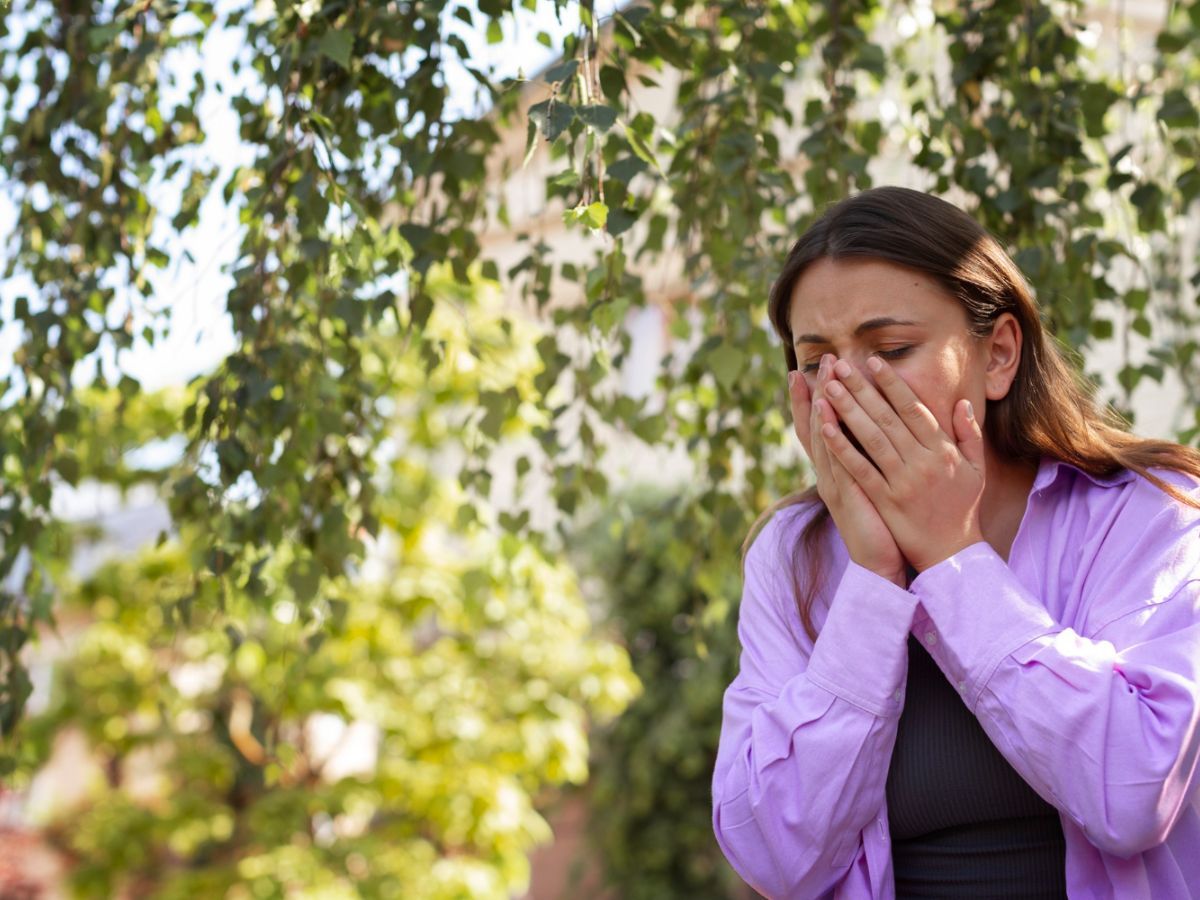Does it ever feel like you're allergic to stress? While that's not technically possible, stress can have a profound impact on your existing allergies, causing them to flare up more than usual.
Allergies surface when the immune system reacts to foreign substances or allergens the body mistakenly identifies as harmful. While many people are familiar with the common triggers of allergies, the role of stress in allergic reactions is less well-known.
But make no mistake: stress can aggravate existing allergy symptoms. To handle stress-related allergies, you must use stress management strategies combined with breakthrough treatments, all of which are available at
Apex Allergy and Asthma in San Antonio, Texas.
Find Relief from Allergies and Stress
Understanding Texas’s Most Prevalent Allergens
Texas—the allergy-prone state, is home to a variety of allergens that can initiate allergic reactions year-round:
- Pollen:
Trees (such as oak and cedar), grasses (like Bermuda and Johnson grass), and weeds (including ragweed and sagebrush) release tiny grains that can cause hay fever. Warmer temperatures and mild winters allow plants to bloom and release pollen for longer periods, extending allergy seasons.
- Dust mites:
Microscopic organisms in household dust can trigger allergy symptoms, especially in the warm, humid Texas climate.
- Pet dander:
Proteins found in pets' skin cells, urine, and saliva can cause allergic reactions, and these allergens are present all year round.
- Mold:
Mold spores, which thrive in humid conditions, can become airborne and cause symptoms, especially after summer rainstorms.
- Certain foods: Common food allergens include peanuts, tree nuts, eggs, milk, soy, wheat, fish, and shellfish, which can cause allergic reactions regardless of the season.
Informing your specialist about stress and allergy symptoms is crucial for effectively managing both in Texas' diverse environment.
The Connection Between Stress and Allergic Reactions
Stress weakens your immune system, heightens allergic reactions, and increases the risk of common Texas allergies. The state’s unique climate, weather patterns, and diverse plant life create a challenging environment for allergy sufferers.
Cyclic Effect
Allergy symptoms contribute to stress, creating a harmful cycle in which stress and allergies feed off each other. For instance, persistent sneezing, itching, or congestion due to allergies can disrupt sleep and be frustrating, both of which lead to amplified stress levels.
When stress levels rise, the body releases stress hormones like cortisol. These stress hormones weaken the immune system, making it more reactive and sensitive to allergens.
Stress also causes the body to release histamine, the chemical that causes allergic reactions. This spike, in turn, may worsen allergy symptoms, perpetuating a cycle of exacerbation. Breaking this cycle involves managing stress effectively while
treating allergy symptoms to achieve lasting relief.
Cortisol and Immune System Suppression
When you're under stress, your body releases cortisol to help manage inflammation, which works well for short-term stress. However, if you're stressed for a long time, your cortisol levels stay high. This can disrupt your immune system, making it less effective at controlling inflammation. As a result, stress causes allergies to get worse, and you could experience heightened allergic reactions.
Increased Inflammation
Being stressed for a long time may cause an imbalance in your body's inflammation signals. This happens because your body keeps releasing cortisol and other stress hormones, making your immune system overreact.
This overreaction triggers increased inflammation, with inflammatory cells releasing signaling molecules known as cytokines, which can worsen your allergy symptoms. By managing stress, you can reduce this overreaction, leading to milder allergy symptoms.
Barrier Function Disruption
Stress doesn't just affect your mood—it can also compromise the protective barriers of your skin and mucous membranes. When stressed, these barriers may weaken, making it easier for allergens like pollen or dust to penetrate and trigger allergic reactions. This can result in heightened sensitivity and more severe allergy symptoms.
Identifying Stress Triggers
Chronic stress can mess with your body’s natural ability to handle stress, making
allergy conditions harder to manage. Potential sources of stress can be:
Work pressure triggers include feeling overwhelmed, constant worry about deadlines, difficulty concentrating, and irritability.
Financial worries involve frequent thoughts about money, difficulty sleeping, and anxiety when paying bills or checking bank accounts.
Personal relationships or strains that manifest as arguments, feeling unsupported, or experiencing a lack of communication with family, friends, or partners.
Common Stress-Induced Allergic Symptoms
Stress affects the entire body, including the skin. It can
heighten inflammatory markers in the blood, exacerbating conditions like hives, eczema, psoriasis, and acne.
- Stress activates the release of chemicals that cause sudden itchy hives or rashes on your skin.
- It tightens your airways, making breathing difficult and causing coughing and wheezing.
- It can worsen hay fever symptoms, causing a stuffy or runny nose and frequent sneezing.
- Stress can intensify eczema, causing patches to become redder, itchier, and more inflamed.
Effectively managing stress puts you in the driver's seat, helping you reduce the frequency and severity of these symptoms. Call
210-490-2051 and take control of your skin health with the
most 5-star reviewed allergist in San Antonio!
Tracking Patterns in Allergy Symptoms Related to Stress
Understanding how stress affects your allergies can help you manage both more effectively and enhance your quality of life. Some people, such as those born to women experiencing significant maternal stress, might have a higher risk of allergies due to changes in their gut bacteria. This can increase their chances of developing conditions like atopic dermatitis, also known as eczema.
For most people, using a combination of tried-and-true techniques can make all the difference between allergy-free days and persistent discomfort.
1. Keep a Symptom Diary
- Record your daily allergy symptoms, including the type (e.g., hives, sneezing, asthma attacks), severity, and duration.
- Note your stress levels each day and any significant stressors you encounter.
2. Identify Patterns
- After a few weeks, review your symptom diary to look for patterns.
- See if there are correlations between high-stress days and the severity or frequency of your allergy symptoms.
3. Use a Rating Scale
- Rate your stress levels and allergy symptoms on a scale of 1 to 10.
- This can help you quantitatively assess the relationship between stress and allergy flare-ups.
4. Note Lifestyle Factors
- Record other factors like diet, sleep quality, and physical activity, as they can also impact your allergies and stress levels.
- This can help you get a more holistic view of your health and identify any additional triggers.
5. Review Regularly
- Set aside time each week to review your entries.
- Look for patterns or triggers you might not have noticed day to day.
6. Consult with a Professional
- Share your findings with your allergist or healthcare provider.
- They can offer insights and help develop strategies to manage your stress and allergy symptoms more effectively.
By recognizing your personal stress triggers and tracking your allergy symptoms, you can gain valuable insights into how stress impacts your health and take proactive steps for a healthier lifestyle.
Experience Relief at the Top-Rated San Antonio Allergy Clinic
Recognizing how stress affects allergies is vital to taking control of your health. Managing stress can significantly improve your well-being and help keep allergy symptoms in check.
Contact us at 210-490-2051 today to schedule an appointment with our double board-certified allergist, Mark Stahl, DO, a trusted expert in the field. Explore personalized treatment options, including allergy testing and biologics. Located conveniently in San Antonio on San Pedro Ave and also on University Heights Blvd, our clinic is dedicated to providing compassionate allergy care for adults and children.
Start your journey toward
better allergy management and a stress-free life now.












